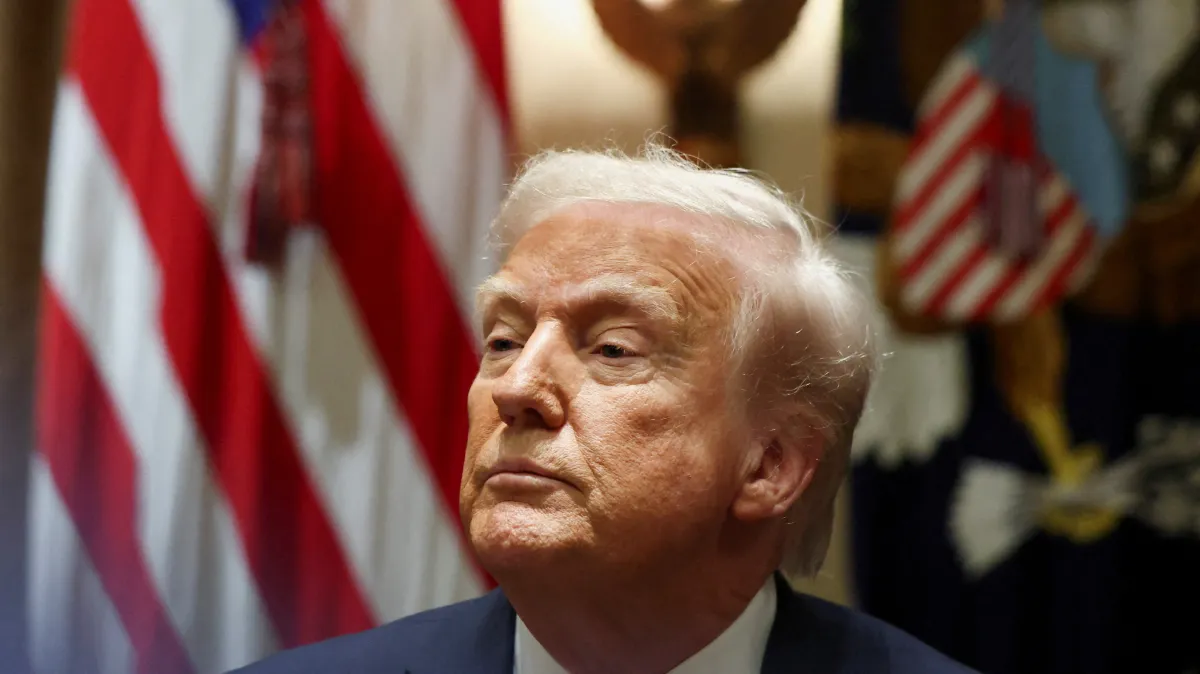Trump Signs Executive Order Aiming to Overhaul U.S. Elections
Table of Contents
- 1. Trump Signs Executive Order Aiming to Overhaul U.S. Elections
- 2. Key Provisions of the Executive Order
- 3. Impact on Voter Registration and Turnout
- 4. Federal Enforcement and Ballot Integrity
- 5. Past Context and Controversies
- 6. Legal Challenges and Future Implications
- 7. potential Counterarguments and Rebuttals
- 8. Comparative Analysis: Voter ID Laws and Their Effects
- 9. What are the potential consequences of requiring proof of citizenship for voter registration, as outlined in Trump’s executive order?
- 10. Interview: Analyzing Trump’s Executive Order on U.S. Elections
By archyde.com News Team | Published March 26, 2025
President Donald Trump, in 2025, signed a sweeping executive action designed to reshape how federal elections are conducted in the United States. The order mandates documentary proof of citizenship for voter registration and insists all ballots be received by election Day. This move has sparked considerable debate and is expected to face legal challenges.
Key Provisions of the Executive Order
The executive order, unveiled on Tuesday, declares that the U.S. has failed “to enforce basic and necessary election protections” and urges states to collaborate on tightening election security.At its core, the order seeks to:
- Require documentary proof of citizenship for voter registration in federal elections.
- demand that all ballots, regardless of method (mail-in, absentee, or in-person), be received by Election Day.
- Strengthen enforcement against non-citizens participating in election governance or contributing to campaigns.
The White House released a statement asserting that “the aim is to restore the confidence of Americans in the election and protect the election process,” justifying the need for stricter voter citizenship verification.
Impact on Voter Registration and Turnout
Currently, voter registration processes vary by state. Many states require a driver’s licence or a form of identification with a numeric code akin to a birth number. While not explicitly demanding proof of citizenship, applicants swear under penalty of perjury that they are citizens, and thier data are often cross-referenced with official databases.
Critics argue that imposing a documentary proof of citizenship requirement could disproportionately effect naturalized citizens, low-income individuals, and minorities who may face challenges in obtaining or possessing such documentation. this could potentially lead to decreased voter turnout, particularly in already marginalized communities.
Such as, in states like Texas, which previously implemented strict voter ID laws, studies have shown a disproportionate impact on minority voters. Similar concerns have been raised about the potential impact of the new federal requirement.
Consider the hypothetical case of Maria Rodriguez, a naturalized citizen who has voted in every election for the past 20 years. She now faces the daunting task of locating her original naturalization certificate – a document she hasn’t needed in decades. The process could be time-consuming and frustrating, potentially discouraging her from voting.
Federal Enforcement and Ballot Integrity
The executive order tasks the U.S. Department of Justice and the Department of Homeland Security with preventing non-citizens from participating in election administration and management. It prioritizes enforcing laws that prohibit foreign nationals from contributing to election campaigns.
Moreover, the regulation addresses ballot deadlines, asserting that federal law clearly defines Election Day. It suggests legal action against states that count ballots received after this date.
This provision directly challenges states that have adopted policies allowing for the counting of mail-in ballots received after Election Day, provided they are postmarked by that date. These policies were frequently enough implemented to accommodate potential postal delays and ensure that all eligible votes are counted.
Past Context and Controversies
President Trump stated that his government woudl take further steps in the coming weeks to “protect and strengthen the association and administration of elections.”
In the past, Trump has repeatedly claimed that immigrants without citizenship influence election outcomes. Though, these claims have never been substantiated with credible evidence. Notably, he raised concerns about immigrant influence following his victory over Hillary Clinton in the 2016 election.
These claims echo a long history of voter fraud allegations in the United States,frequently enough fueled by partisan politics. While isolated incidents of voter fraud have occurred, studies have consistently shown that it is statistically rare and does not substantially impact election outcomes.
For example, a comprehensive study by the Brennan Center for Justice found that incidents of voter fraud are exceedingly rare, with rates typically ranging from 0.0003% to 0.0025%.
Legal Challenges and Future Implications
The Associated Press anticipates that numerous organizations advocating for voting rights will challenge the executive order in court.Legal arguments are likely to focus on:
- Potential violations of the Voting Rights Act, which prohibits discriminatory voting practices.
- Constitutional concerns regarding the right to vote.
- The potential for disenfranchisement of eligible voters.
The legal battles could have notable implications for future elections,potentially shaping voter access and election administration procedures across the country. Similar legal challenges to voter ID laws and othre voting restrictions have resulted in varying outcomes, depending on the specific state and the composition of the courts involved.
The future of this executive order remains uncertain, contingent on the outcome of these legal challenges and the evolving political landscape.
potential Counterarguments and Rebuttals
Proponents of the executive order might argue that it is a necessary measure to prevent voter fraud and ensure the integrity of elections. They could point to isolated cases of non-citizen voting as evidence of a systemic problem.
however, critics would counter that these isolated incidents do not justify the potential disenfranchisement of legitimate voters. They would argue that existing safeguards, such as voter registration verification processes and penalties for perjury, are sufficient to deter and detect illegal voting.
Furthermore, they would emphasize the importance of protecting the right to vote for all eligible citizens, regardless of their background or circumstances.
Comparative Analysis: Voter ID Laws and Their Effects
The debate surrounding this executive order mirrors the ongoing controversy surrounding state-level voter ID laws. Examining the impact of these laws can provide valuable insights into the potential consequences of the new federal mandate.
| State | Voter ID Requirement | Potential Impact |
|---|---|---|
| Georgia | Strict photo ID required | Studies suggest a disproportionate impact on minority voters and lower turnout in some demographic groups. |
| Texas | Limited forms of photo ID accepted | Similar to Georgia, concerns about disenfranchisement of minority and low-income voters have been raised. |
| Wisconsin | Strict photo ID required | Legal challenges and debates over the potential for voter suppression. |
This table illustrates the complexities of voter ID laws and their potential impact on different populations. As the federal government moves forward with its own citizenship verification requirements,it will be crucial to learn from the experiences of these states and address the legitimate concerns about voter access and fairness.
What are the potential consequences of requiring proof of citizenship for voter registration, as outlined in Trump’s executive order?
Interview: Analyzing Trump’s Executive Order on U.S. Elections
Archyde: Welcome, everyone, and thank you for joining us. Today,we have Dr. Eleanor Vance, a leading expert in election law and policy, to discuss President Trump’s recent executive order aiming to overhaul U.S. elections. Dr.Vance, welcome.
Dr. Vance: Thank you for having me.
Archyde: The executive order mandates proof of citizenship for voter registration and requires all ballots to be received by Election Day. What are your initial thoughts on these key provisions?
Dr. Vance: The order represents a meaningful shift. Requiring documentary proof of citizenship could potentially disenfranchise eligible voters, particularly naturalized citizens, low-income individuals, and minorities who may face difficulties in obtaining the necessary documents. The Election Day deadline also presents challenges,especially for mail-in ballots,and could impact voter participation.
Archyde: the White House states this is to protect the election process and restore American’s confidence. Do you believe these measures are proportionate to the alleged problem of voter fraud?
Dr.Vance: Studies consistently show that voter fraud is statistically rare. While every instance should be investigated, the potential for disenfranchisement of legitimate voters seems disproportionate to the actual risk. We have to ask ourselves if the cure is worse than the disease.
Archyde: This order tasks the Department of justice and homeland Security with enforcement. What impact could this have on state election processes?
dr. Vance: It could lead to federal overreach, creating tension with state election officials. Each state has different regulations, so blanket federal enforcement may not be effective. There’s also the potential for legal challenges based on states rights.
Archyde: We’ve seen instances of strict voter ID laws in states like Georgia and Texas. What lessons can we learn from these state-level examples about the possible effects of this new federal mandate?
Dr. Vance: The experiences of Georgia, Texas, and other states with voter ID laws highlight the potential for reduced voter turnout, especially among minority groups. The new requirements could create similar barriers, making it harder for eligible citizens to vote. It’s crucial to analyze those experiences to understand the possible impact on different populations across the US.
Archyde: What potential legal challenges do you anticipate?
Dr. Vance: I expect challenges centered around the Voting Rights Act, which prohibits discriminatory voting practices. There might also be constitutional arguments regarding the right to vote and the potential for disenfranchisement. The outcome of these legal battles could shape voter access and election administration for years to come.
archyde: Considering the past claims about election influence and this current order, the narrative seems to be centered around concerns of voter fraud. What are your thoughts on this recurring theme?
Dr. Vance: The narrative of widespread voter fraud has been used in the past to promote stricter voting mandates. While isolated incidents should be addressed, it’s essential to avoid policies based on unsubstantiated claims as they can undermine confidence in our electoral system.
Archyde: Dr. Vance, what do you think is the most significant ramification of this executive order on U.S. democracy?
Dr. Vance: The most significant ramification could be increased barriers to voting, especially for marginalized communities. This could have a lasting impact on voter access and participation in future elections. This would alter the very foundation of U.S. democratic processes.
Archyde: Thank you for your insights, Dr. Vance. It’s been a very informative discussion. To our audience, we encourage you to share your thoughts in the comments below and continue to follow archyde.com for further updates on this developing story.






